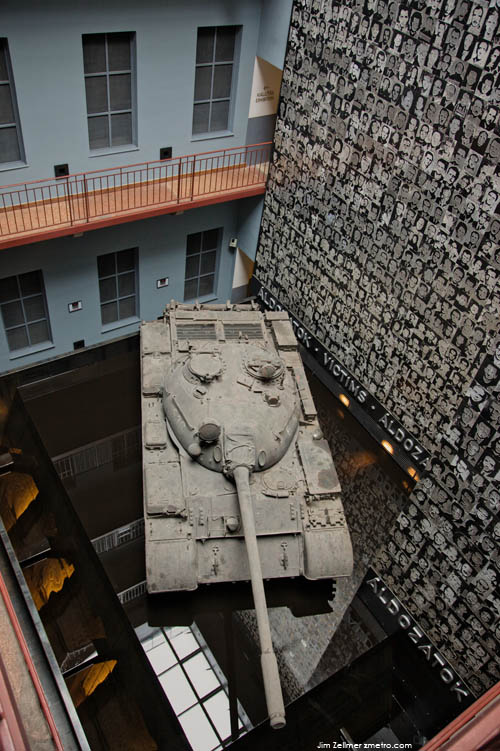Monona, WI:
Category: Current Events
Independence Day USA
I had the opportunity to recently visit Budapest’s House of Terror Museum. The museum is housed in a former security services building and provides a powerful reminder of the forces of tyranny. This photo features victim images above a Soviet era tank. 
An appropriate reminder of the price of freedom, today, the Fourth of July, 2009.
An a more pleasant note, Jeff Sullivan posted a gorgeous Yosemite image set here.
It is hard to go wrong at stunning Yosemite! God Bless America.
Washington Post Sells Access to Lobbyists
For $25,000 to $250,000, The Washington Post is offering lobbyists and association executives off-the-record, nonconfrontational access to “those powerful few” — Obama administration officials, members of Congress, and the paper’s own reporters and editors.
The astonishing offer is detailed in a flier circulated Wednesday to a health care lobbyist, who provided it to a reporter because the lobbyist said he feels it’s a conflict for the paper to charge for access to, as the flier says, its “health care reporting and editorial staff.”
The offer — which essentially turns a news organization into a facilitator for private lobbyist-official encounters — is a new sign of the lengths to which news organizations will go to find revenue at a time when most newspapers are struggling for survival.
And it’s a turn of the times that a lobbyist is scolding The Washington Post for its ethical practices.
“Underwriting Opportunity: An evening with the right people can alter the debate,” says the one-page flier. “Underwrite and participate in this intimate and exclusive Washington Post Salon, an off-the-record dinner and discussion at the home of CEO and Publisher Katharine Weymouth. … Bring your organization’s CEO or executive director literally to the table. Interact with key Obama administration and congressional leaders …
“Spirited? Yes. Confrontational? No. The relaxed setting in the home of Katharine Weymouth assures it. What is guaranteed is a collegial evening, with Obama administration officials, Congress members, business leaders, advocacy leaders and other select minds typically on the guest list of 20 or less. …
Read more: http://www.politico.com/news/stories/0709/24441.html#ixzz0K6yNKyHp&C
Related: Helen Thomas.
Stunning pictures of the volcano that blew a hole in the sky as astronauts witness eruption from International Space Station
Framed by a circle of clouds, this is a stunning illustration of Nature’s powerful force. A plume of smoke, ash and steam soars five miles into the sky from an erupting volcano. The extraordinary image was captured by the crew of the International Space Station 220 miles above a remote Russian island in the North Pacific.
Southwest Airlines Milwaukee Destinations Announced
Great news for Wisconsin flyers:
WN will enter MKE on 10/31/09.
MKE will have nonstop service to:
BWI: 3
MCI: 3
LAS: 2
MCO: 2
PHX: 1
TPA: 1
This will certainly affect the Madison airport’s traffic.
Who Switched the Playbooks
When I was starting up in China, many experts cautioned me on what I would encounter. “It’s not a free market and there’s no rule of law, they told me. “The government controls the courts, the companies and the banks. Central planners in Beijing, not the marketplace, decide what goods to produce and which companies should produce them.”
“Decisions are made for political, not economic reasons,” they went on to explain. “The heads of China’s state-owned enterprises serve at the pleasure of the Party, the banks are told what loans to make, and making a profit is secondary to ensuring employment. That’s the reason why China’s banks are a mess and full of non-performing loans.”
Occasionally, I would push back, noting the economic progress that China had made since Deng Xiaoping opened the economy in 1978. “You don’t believe the government’s numbers, do you?” they would ask incredulously. “Everyone knows they’re manufactured to convey whatever message the government wants. And, when it comes to financial statements, forget it. Chinese companies have at least three sets of books, and you can’t believe any of them.”
Peter Bernstein’s Lasting Lessons
The news came to us at HBR just after our newest issue went to the printer; that issue contains, sadly, the last article he wrote for our pages. Because it is the July-August issue, and will arrive on newsstands two weeks hence, it will seem strange to many readers that the byline makes no note of his passing — and worse, that the editor’s letter is mute on the many accomplishments of his rich and long life. Such are the perils of print publishing, and for that we apologize.
But here let it be said that, when work began last January on envisioning the July-August issue — a special, double-sized issue devoted wholly to exploring how the business landscape would be transformed by the financial crisis and recession — Peter Bernstein’s voice was the first we sought to include. He was the master at explaining issues of financial risk, and there has scarcely been a time when the world needed his kind of clear analysis more.
In response to a vaguely worded invitation from us (deliberately so, in the interests of giving Peter full license to address what he felt needed to be addressed), he came back with a tightly crafted essay called “The Moral Hazard Economy.”
The End of the Affair
The phrase “bankrupt General Motors,” which we expect to hear uttered on Monday, leaves Americans my age in economic shock. The words are as melodramatic as “Mom’s nude photos.” And, indeed, if we want to understand what doomed the American automobile, we should give up on economics and turn to melodrama.
Politicians, journalists, financial analysts and other purveyors of banality have been looking at cars as if a convertible were a business. Fire the MBAs and hire a poet. The fate of Detroit isn’t a matter of financial crisis, foreign competition, corporate greed, union intransigence, energy costs or measuring the shoe size of the footprints in the carbon. It’s a tragic romance–unleashed passions, titanic clashes, lost love and wild horses.
Foremost are the horses. Cars can’t be comprehended without them. A hundred and some years ago Rudyard Kipling wrote “The Ballad of the King’s Jest,” in which an Afghan tribesman avers: Four things greater than all things are,–Women and Horses and Power and War.
Spy Fired Shot That Changed West Germany
It was called “the shot that changed the republic.”
The killing in 1967 of an unarmed demonstrator by a police officer in West Berlin set off a left-wing protest movement and put conservative West Germany on course to evolve into the progressive country it has become today.
Now a discovery in the archives of the East German secret police, known as the Stasi, has upended Germany’s perception of its postwar history. The killer, Karl-Heinz Kurras, though working for the West Berlin police, was at the time also acting as a Stasi spy for East Germany.
On Manufacturing in China
HE recent scandals about poisoned baby milk, contaminated pet food and dangerous toys from China have raised questions about manufacturing standards in the country that has become factory to the world. In China’s defence, it was probably inevitable that as production grew so would the problems associated with it, at least in the short term. Similarly, it could be argued that China is going through the same quality cycle that occurred during Japan’s post-war development or America’s manufacturing boom in the late 19th century—but in an environment with infinitely more scrutiny.
A response to both these observations can be found in “Poorly Made in China” by Paul Midler, a fluent Chinese speaker who in 2001 moved to China to work as a consultant to the growing numbers of Western companies now replacing factories in Europe and America with subcontracting relationships in the emerging industrial zone surrounding Guangzhou. It was the perfect period to arrive. The normal problems of starting a business, such as getting clients or providing a value proposition, do not hinder Mr Midler, who had the benefit of being in the right place at the right time.
